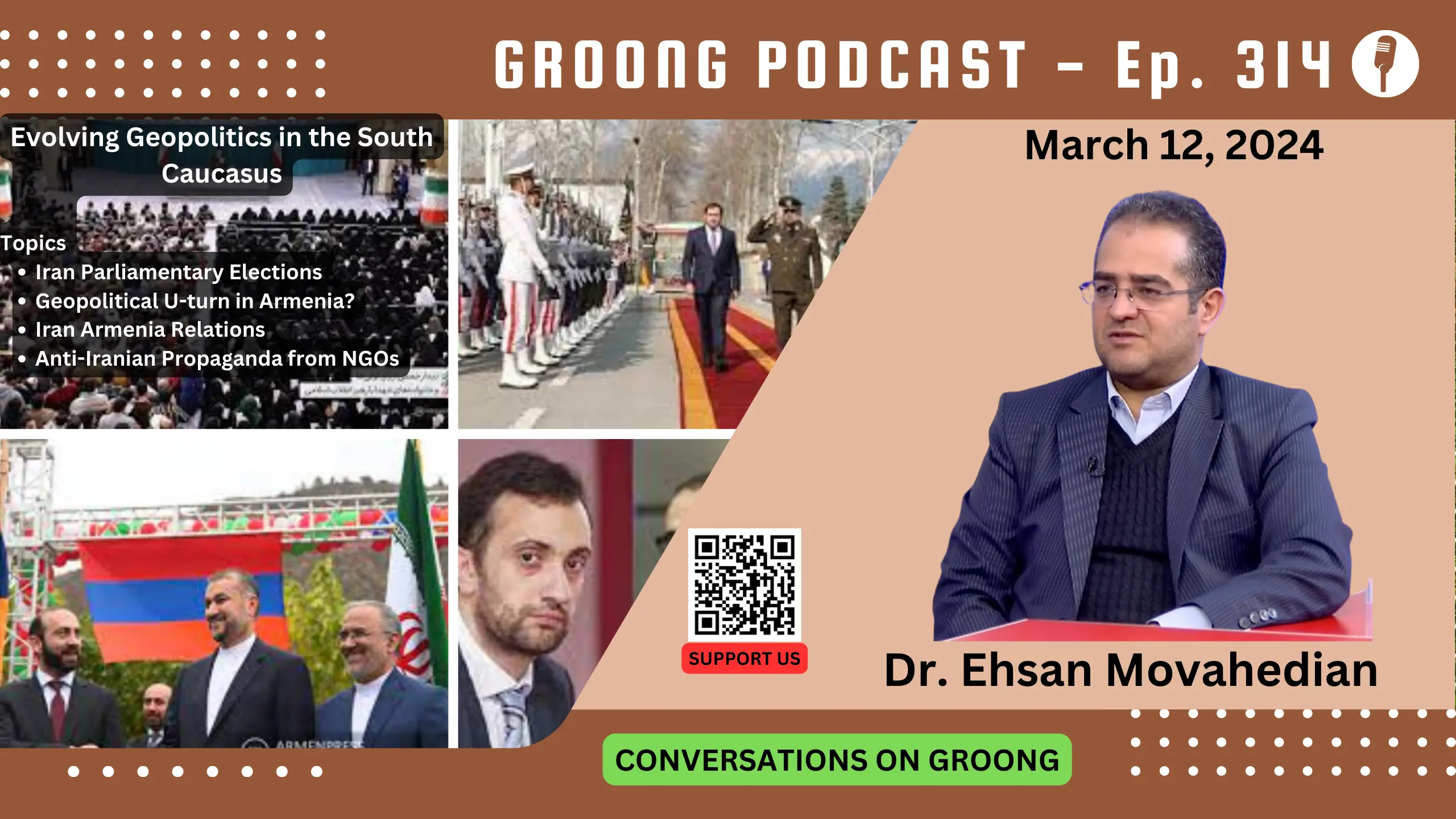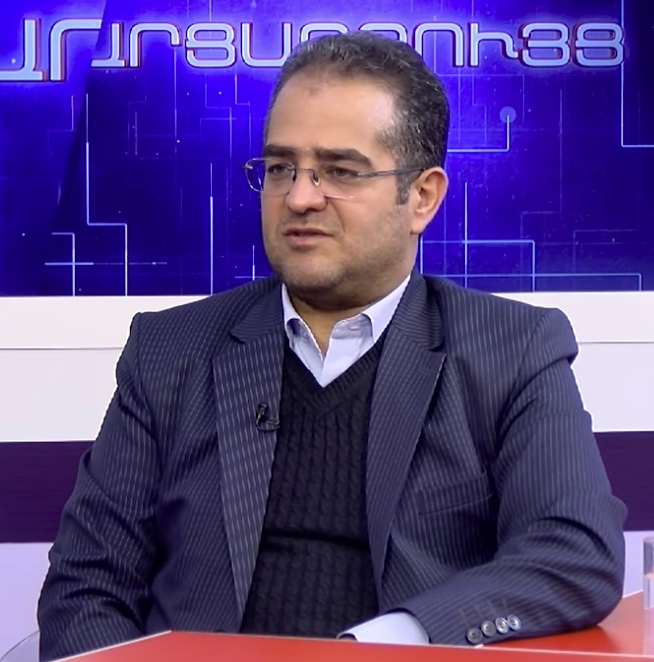
Groong Links:
Guest:
Topics:
- Iran Parliamentary Elections
- Geopolitical U-turn in Armenia?
- Iran Armenia Relations
- Anti-Iranian Propaganda from NGOs
Episode 314 | Recorded: March 11, 2024
Show Notes
Evolving Geopolitics in the South Caucasus
Iran Parliamentary Elections
On March 1, 2024 Iran held parliamentary elections. The turnout of these elections was 41% which, based on our understanding, indicates that many of the seats in the Majles will go to a 2nd round of voting scheduled in May. Additionally, we understand that many seats were won by conservative candidates.
Questions:
- What should regional, and also global, actors expect from the outcome of these elections?
- Is it possible that the leader of Iran might change?
- How likely are foreign policy changes based on these elections?
Geopolitical U-Turn in Armenia?
When the 2018 regime change happened in Armenia, there were many speculations about the future geopolitical direction of the new government, specifically that Armenia was going to make a u-turn to the west.. After the 2020 war and especially after the ethnic cleansing of Artsakh in September 2023, it seems Armenia is making steadfast and accelerated steps in a direction away from its security cooperation with the CSTO and Russia, in what Pashinyan’s government calls “security diversification,” but which in reality clearly looks like a divorce.
It is important to highlight that a recent MPG poll found that over 58% of Armenians do not see these moves as corresponding to Armenian security interests, and 37% agree with the government.
All this is being done in the context of constant and increasingly open and aggressive threats from Azerbaijan about attacking Armenia and forcing a corridor through Syunik. In reality, they have their sights on all of Armenia through Aliyev’s “Western Azerbaijan” propaganda.
Meanwhile, Russian and Iranian officials define their relations as very close. More recently the relations have been elevated to a strategic alliance since the Ukraine war, when Russia began to rely more heavily on Iran for military cooperation.
Questions:
- How is Iran viewing Armenia’s potential change of security architecture?
- Given Armenia’s geographic neighborhood, is a change of security architecture a realistic goal?
- Georgia has recently been granted candidacy for EU membership. Is Georgia’s security orientation also a concern for Iran?
Iran-Armenia Relations
In the context of Armenia’s antagonism with Russia, the role of Iran in Armenia’s future security architecture seems at once both crucial, as well as in question. Armenian officials praise Iran’s role in the “diversification” of Armenia’s foreign policy, but at the same time it seems that the Pashinyan regime is obviously holding back from deeper cooperation. For instance, it has been reported that Armenia has refused Iranian offers to obtain military supplies.
Over the past few months, Armenian and Iranian officials have been engaged in an intense series of high level meetings. In February, Deputy Prime Minister, Mher Grigoryan was in Iran. Last week, Armenia’s Defense Minister, Suren Papikyan, visited Iran. Deputy Foreign Minister Vahan Kostanyan was also in Tehran just over this past weekend. Iranian officials have also visited Armenia recently, including Foreign Minister Hossein Amirabdollahian who was in Yerevan just this last December 2023.
Publicly, the only consistent message that is being communicated is that Iran is against the influence of foreign forces in the security of the region.
Questions:
- Of course, it’s great to meet and collaborate on accelerating mutual foreign policy goals. However, is this the reason that Armenian and Iranian officials are meeting so frequently or are these meetings trying to reconcile differences and potential conflicts?
- Why is Iran concerned about an observer mission by the EU in Armenia?
- Iran has also proposed stationing monitors (to replace the EU monitors) on Armenia’s borders.
- What is a red line and what is tolerable by Iran?
- French radars deployed in Armenia?
- Indian military supplies to Armenia?
- Azerbaijani excursion into Armenia? Invasion of Armenia?
- Note that Azerbaijan is already 200 sq.km. inside Armenia, at what point does it trigger Iran?
- While deputy FM Kostanyan was in Tehran, both sides called for expanded and closer relations. Are these feelgood statements, or is there a concrete plan of action, and agenda behind such statements?
Economic Relations
On January 2 of this year, Iran signed a historic free trade agreement with the EAEU, with which its sole adjacent border is through Armenia.
Question:
- What is your perspective on the decline in Armenian-Russian relations, amidst blooming relations between Iran, Russia and the rest of the EAEU countries?
As far as economic relations are concerned, Iran and Russia have made strides in their North-South connectivity through Azerbaijan. Iran has said that multiple routes for the North-South economic corridor would be ideal. There have been some advances in connecting to the Black Sea through Armenia and Georgia.
Questions:
- Do you see issues in the progress or realization of the INSTC through Armenia?
- Has Iran’s consulate in Kapan, Armenia’s south, started making a difference?
- How do you assess the influence of Azerbaijan on Iran’s regional policies, once the North-South economy picks up through it?
Anti-Iranian Propaganda by NGOs
Over the past 2 weeks, the Union of Informed Citizens, one of the most powerful and well-financed foreign-supported NGOs in Armenia, has been engaged in anti-Iranian propaganda, including social media postings as well as videos.
This NGO is led by Daniel Ioannisyan, who seems to enjoy the sponsorship of the Pashinyan regime, as the Armenian government has frequently engaged Ioannisyan in various projects, the most prominent being the “rewrite” of the Armenian constitution.
What was the content of these videos?
- One of the videos claims that Iran is not interested in a strong Armenia.
- Meanwhile another one presents Iran as an ally of forces such as Hezbollah.
Questions:
- What are your thoughts about the timing and content of this anti-Iranian material?
- Is a weak Armenia in Iran’s interest?
- How do such things affect Armenian-Iranian relations? Or do they?
Wrap-up
That’s our show! We hope you found it useful. Please find us on Social Media and follow us everywhere you get your Armenian news. Thanks to Laura Osborn for the music on our podcasts.
Guests

Ehsan Movahedian
Dr. Ehsan Movahedian is an International Relations specialist, ATU University, in Tehran, Iran. He focuses on multidisciplinary research about Digital Diplomacy and politics.
Hosts

Asbed Bedrossian
Asbed is founder of the Armenian News Network Groong and co-founder of the ANN/Groong podcast.

Hovik Manucharyan
Hovik Manucharyan is an information security engineer who moved from Seattle to Armenia in 2022. He co-founded the ANN/Groong podcast in 2020 and has been a contributor to Groong News since the late 1990s.
Disclaimer: The views expressed by Hovik Manucharyan on the ANN/Groong podcast are his own and do not necessarily reflect the opinions of his employer or any other organization.